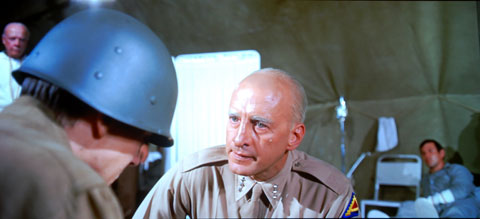Long-Sealed Military Files Will Be Opened
Long-Sealed Military Files Will Be Opened (St. Louis Post-Dispatch, June 6, p.1)
Archivists are about to unseal a mother lode of military history along Page Avenue in Overland. A ceremony Saturday at the National Personnel Records Center will mark the opening of military files that until now have been off-limits to most Americans.
Among the gems:
* Gen. Dwight Eisenhower’s rating in mid-1944 of Lt. Gen. George S. Patton Jr. The report closes with these words on Patton: “A brilliant fighter and leader. Impulsive and quick-tempered. Likely to speak in public in an ill-considered fashion.”
* Gen. Omar Bradley’s radiogram in 1951 to Gen. Douglas MacArthur in Tokyo, in which Bradley quotes President Harry S Truman: “Deeply regret that it becomes my duty as president and commander in chief of United States military forces to replace you . . .”
* Lt. Jackie Robinson’s request in August 1944 for a discharge on medical grounds — a college football injury. He writes, “In checking with the Special Service Branch I was told there were no openings for Colored Officers in that field.”
* A Pentagon recommendation in May 1959 against a request from a group of disc jockeys that the Army let Pfc. Elvis Presley leave his duty station in Germany for a convention in Miami. “Prior to his induction, it was established that he would be handled exactly as any other inductee,” the memo says. It adds that “any indication of unusual treatment would impair this highly favorable public impression. This would be particularly true of a trip to Miami at the height of the Berlin Crisis.”
What’s more, historians, biographers — even the merely curious — will soon have access to the military personnel records of about 150 well-known Americans. Among them: John F. Kennedy, Gen. Mark Clark, Clark Gable, Herman Wouk, Audie Murphy, Steve McQueen — even Grover Cleveland Alexander.
Why the sudden openness at the records center? Because millions of old personnel records no longer belong to the armed forces. Now, they’re the property of the National Archives, which runs the records center here. Until now, says archivist Eric Voelz, “we were the physical custodians, but the services were the legal custodians.” The archival program’s assistant director, Brian K. McGraw, says: “For years, historians and genealogists have wanted access. But they weren’t public records. We could open them only to the veteran himself, to his next of kin or to his branch of the service.” But in 1999, the Pentagon and the National Archives decided in principle that the records deserved to be public. Last summer, the final details were worked out. Now, the records “cease to belong to the military and instead belong to the American people,” says Bill Seibert, chief of the archival operations branch. “They’re public documents.”
The center houses military records on 56 million individuals, beginning when the 19th century rolled over into the 20th. “That’s when the system of individual military records began,” says Seibert. (Earlier records — most of them handwritten ship’s rosters and regimental rolls — reside in Washington.)
But McGraw, Voelz and Seibert are quick to note that most of what’s here will remain closed for years to come. In their drawn-out negotiations, the Pentagon and the National Archives decided to keep the records sealed until 62 years past the date an individual left active service. That puts most World War II records out of reach for several more years. And because of complications from a fire at the records center in 1973, files of Army and Air Force veterans will be withheld even longer — until 2023. Coast Guard records will be unavailable until 2026. In other cases, what Voelz calls “preservation issues” — fragile, crumbling paper — will keep some records on hold.
What’s opening up as of Saturday are individual records in three batches:
*Navy enlisted men from 1885 until Sept. 8, 1939.
*Marine Corps enlisted men from 1906 until 1939, in general.
*The first 150 of about 3,000 Americans identified as “persons of exceptional prominence” — Patton, Presley and the rest. All of these VIPs have been dead for at least 10 years. President Richard M. Nixon “barely missed the cut,” says Seibert.
The VIP records are sure to attract scholars and writers. In fact, early word of the opening has sparked premature interest. Voelz says: “I’ve already had historians and biographers calling to get in. I’m telling them that they have to wait until June 11.”
These long delays are more than adequate to protect privacy interests of those concerned. This should be a treasure trove of information for scholars, amateur historians, and journalists.
A “Related Links” sidebar links some interesting documents:
̢ۢ Request for interview of PFC Elvis Presley (all documents require PDF reader)
• Truman’s notification relieving MacArthur of command
• Patton ‘job review’ by Eisenhower
• Fan’s handwritten note requesting Elvis be returned to private life
• Presley ‘good behavior’ release from military
̢ۢ Presley article from the Chicago Evening American
• Jack R. Robinson’s records




![[Update] Analysis of NARA's Letter to Former President Trump](https://otb.cachefly.net/wp-content/uploads/2018/02/top-secret-stamp-magnifying-glass-clearance-large-512x256.jpg)

The interesting game in such reacords, to my mind is wondering how much of the records creation was to save for posterity, and how much was created to save one’s posterior.